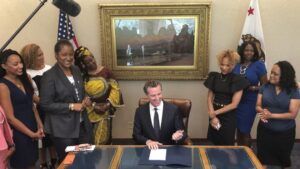
African Americans in Florida who wear natural hair, locks, twists, cornrows and braids, would be protected from discrimination in schools and at work under a bill proposed by state Senator Randolph Bracy, a Democrat from Orlando.
Bracy has said he intends to file a bill before the 2020 legislative session gets underway next month. The Florida Crown Act “stands for creating a respectful and open world for natural hair, which is an essential part of a national movement to acknowledge the cultural and social manifestations of racial identity, and to uphold our shared values of equity and fairness,” Bracy said at a news conference earlier this month at the Cheryl Couture Salon in Pine Hills, according to the Orlando Sentinel.
On July 3, California became the first state to protect citizens from discrimination based on hairstyle, a law greeted with both enthusiasm and a touch of dismay by people of color.
According to usatoday.com, Tiffany Dena Loftin, the California youth and college director with the state’s chapter of the National Association for the Advancement of Colored People, said, “I’m not going to say we shouldn’t have a law that allows us to wear our hair the way it naturally is, but it’s also sad in 2019, we have one in the first place.”
Everyone has their own way of expressing themselves with their hair. Hair can be a beautiful thing, and nobody should be looked at differently or judged differently because of it.
Should your hair affect your career, or impede your education?
Stephon Symonette, a fourth-year public relations major, doesn’t think so. “I disagree with hair affecting your life and career life. Companies should allow their employees to wear what is naturally on your body. My hair shouldn’t make companies or employers look at me different. I know what I can bring to the table,” he said.
Hair doesn’t represent who we are as people. It doesn’t get our jobs, degrees, or grades in school. People get judged by many things and, unfortunately, hair is one of those factors. But African American hairstyles don’t make people criminals. Everyone isn’t supposed to look the same or how you want them to look.
Dylan Frison, a third-year graphics major, said, “I don’t believe your hair should affect your career or life. Your hair shouldn’t be able to tell who you are as a person it just makes you different and some of the hairstyles, we have in the African American society is just cultural.”